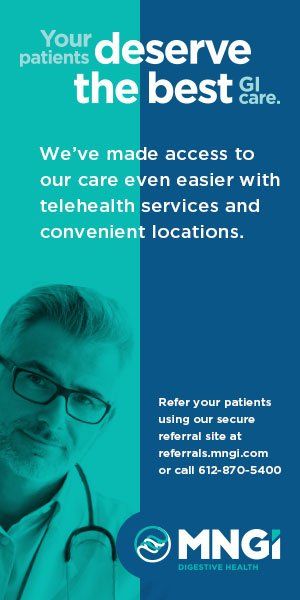Capsules
State Medical Cannabis Program Expands Delivery Options
The Minnesota Department of Health (MDH) recently announced that it has approved infused edibles in the form of gummies and chews as a new medical cannabis delivery method in the state’s medical cannabis program. The new delivery method will become effective Aug. 1, 2022. A rulemaking process that will outline requirements for labeling, safety messaging, packaging, and testing will launch this month. Current permitted delivery forms include pills, vapor oil, liquids, topicals, powdered mixtures, and orally dissolvable products, like lozenges “Expanding delivery methods to gummies and chews will mean more options for patients who cannot tolerate current available forms of medical cannabis,” said Minnesota Commissioner of Health Jan Malcolm. Coming in March 2022, registered medical cannabis patients will also be eligible for dried raw, smokable cannabis, which was approved by the 2021 Minnesota Legislature. Rulemaking for dried raw cannabis is also currently in process. No new conditions were added this year. As in past years, MDH conducted a formal petition and comment process to solicit public input on potential qualifying medical conditions and delivery methods for medicine. Since 2016, petitioners have requested anxiety disorder or panic disorder as a qualifying medical condition. Each year it was denied due to lack of clinical evidence and the desire to avoid any unintended consequences. This year at the request of Commissioner Malcolm, the MDH Office of Medical Cannabis conducted an in-depth review, which included a research review of anxiety disorder as a qualifying medical condition. Ultimately the addition was not approved due to a lack of scientific evidence to support effectiveness as well as concerns expressed by health care practitioners. “We received many comments from health care practitioners treating patients with anxiety disorder, and they urged us to not approve it as a qualifying medical condition,” said Commissioner Malcolm. “We recognize that not everyone has equal access to therapy – which is considered the front-line treatment – but ultimately we concluded that the risk of additional harms to patients outweighed perceived benefits.”
Hennepin Healthcare Hosts Black Men with Stethoscopes Youth Summit
As part of a series of initiatives and events organized by Hennepin Healthcare to expose youth to careers in medicine, while connecting them to high quality work-based learning opportunities and creating access to a network of BIPOC healthcare professionals, Hennepin Health recently hosted the first Black Men with Stethoscopes Youth Summit. The event took place at Hennepin Healthcare’s Clinic & Specialty Center in downtown Minneapolis, where participants, aged 12-18, had the opportunity to experience real-life medical simulations, tour the Hennepin Healthcare campus, learn about the path to medical and dental schools, and discover helpful tools for goal-setting and time management all while interacting with Black medical professionals. “We couldn’t be more excited to host this inaugural event for our community as part of a bigger plan to address inequalities and support our talented youth through further job shadowing, paid internships and mentoring opportunities,” explains Dr. Nneka Sederstrom, Chief Health Equity Officer at Hennepin Healthcare. “Knowing that this exposure may play a role in helping these young men consider applying their potential to a medical career is extremely rewarding – and a tremendous benefit to the medical profession, as well as the community.” Over the past few years, the Association of American Medical Colleges found that only 3% of total U.S. Medical School applicants self-identified as Black men. In the 2020-2021 applicant pool, only 8% of those who accepted and enrolled identified as Black. Hoping those numbers change, pediatric critical care physician Dr. Andrew Kiragu, said “Everyone deserves the opportunity to pursue a rewarding career – one that involves caring for others by applying medical skills certainly falls in this category. It is important that Black children are exposed to the multitude of STEM-based careers that are available and how to pursue them. That’s exactly why we want young Black men to see the possibilities of a career in Medicine. It is crucial that they see physicians who look like them and can provide mentorship so that they can see themselves in a fulfilling medical career.”
Mayo Report Cites Lack of Diversity in Cancer Research Funding
A commentary recently published in Nature Magazine by researchers from Mayo Clinic and the University of Southern California suggests that agencies funding biomedical research must strive for diversity, equity and inclusion in research decisions, and that these agencies will only be successful if they address bias in the research funding process. “The lack of diversity in science and medicine exacerbates and compounds the problem of health disparities,” says Folakemi Odedina, Ph.D., a Mayo Clinic cancer researcher. Dr. Odedina’s education, training and community outreach activities have focused on addressing health disparities in racial, ethnic minority and underserved communities. Dr. Odedina and co-author Mariana Stern, Ph.D., of the University of Southern California write that the relatively small number of minority clinicians and researchers in biomedical research in the U.S., and the lack of minority participants in clinical trials, poses significant barriers to addressing health disparities. For example, “Black investigators continue to be under funded in science and medicine due to bias in the scientific review process,” says Dr. Odedina. She says multiple reasons have been associated with this bias, including a perception that Black investigators are less capable or less accomplished than White or Asian candidates. The authors say another factor limiting diversity in biomedical research is a misalignment between the priorities of funding agencies and the research focus of scientists from underrepresented groups. “Funding decisions that do not appropriately weigh the potential impact of awards on minority communities or the importance of promoting the careers of diverse scientists Black, Latinx and Indigenous miss the opportunity to improve diversity, equity and inclusion in science and medicine, and improve the health of minority communities,” says Dr. Odedina. She noted that bias toward Black scientists in academic funding has led many to switch to academic administrative positions or to leave academia altogether, as it is very difficult to be successful without extramural funding; “In the U.S., there is a nationwide problem retaining Black scientists in academia,”
Office of Rural Health Announces 2021 Awards
Every year the Minnesota Office of Rural Health and Primary Care announces awards given to groups and individuals who have made a significant contribution to improving rural health in our state. Traditionally announced at the annual summertime rural health conference in Duluth,
COVID-19 considerations rescheduled the announcement to coincide with Gov. Walz’s newly proclaimed Rural Health Day (November 18). The MN Rural Health Hero Award was given to Laurissa L. Stigen, MS, RN, System Campus Partnership and Project Coordinator at the University of Minnesota School of Nursing, and Registered Nurse at the Lake Region Healthcare in Fergus Falls. Laura worked to expand education for undergraduate nursing students in rural schools and towns. She also coordinated a project to increase and support Psychiatric Mental Health Advanced Practice Registered Nurses in rural communities and served as President of the Minnesota Rural Health Association. The MN Rural Health Team Award was given to the Cass Lake Indian Health Service and Leech Lake Band of Ojibwe Health Division, Cass Lake. They collaborated to develop and implement a mass immunization model increasing access to COVID-19 vaccines for rural Minnesotans. While these organizations traditionally provide health care services for eligible Native Americans, the multi-disciplinary team conveyed the importance of taking a public health approach to protect the community at large. The team’s plan to provide vaccinations to all regardless of demographics was approved by the Indian Health Service and Tribal leadership. It became one of the best and fastest vaccine administration teams in the state and their vaccination model is now considered a best practice. It has garnered the attention of federal, state and private sector partners across the nation. The 2021 MN Rural Health Lifetime Achievement Award has been given to Raymond G. Christensen MD, an Associate Professor at the University of Minnesota Medical School, Duluth Campus, where he also serves as Associate Dean for Rural Health, and Associate Director of the Rural Physicians Associate Program (RPAP). His supervision and faculty leadership contribute to the supply of family physicians and rural physicians for Minnesota. Over the years, numerous practicing physicians have had the pleasure of calling him mentor, role model, and advocate. Dr. Christensen’s commitment to and impact on rural health in Minnesota spans five decades and includes an extraordinary lifetime of achievements.
North Memorial Begins Construction on New Blaine Clinic
North Memorial Health recently broke ground on an undeveloped lot located on the southwest corner lot of Lexington Ave and 109th Street in Blaine. The new building will include North Memorial Health primary care clinics, specialty care clinics and hospice. The new state-of-the-art facility will encompass nearly 50,000 square feet and provide expanded primary, specialty and urgent care services to the northern suburban communities. It will also house some administrative and support services. Once completed, this clinic will be replacing North Memorial Health’s nearby clinics, currently housed in a multi-tenant medical office on Ulysses Street NE. “This new clinic will help us meet the growing need for primary, specialty and urgent care services for customers in the Blaine community,” said J. Kevin Croston, MD, and CEO of North Memorial Health. “We are excited to be creating a new, state-of -the-art space that will provide an even better customer experience and a wonderful environment for our team members.” The location was chosen by North Memorial Health’s leadership team with help from Forte Real Estate (formerly The Excelsior Group), a local advisory firm. The project team includes Gardner Builders as the General Contractor and HGA Architects & Engineers as the base building architect. MSP Commercial is the developer of the project and will also be managing it after completion. Construction will continue throughout the next three seasons, with a scheduled opening in fall, 2022.
U of M Medical School Launches Psilocybin Study
A new clinical trial led by the University of Minnesota Medical School seeks to understand how psilocybin alters brain function with the hope of informing improvements in current treatment options for certain mental illnesses. It’s the first-ever study to measure how this compound alters the brain’s use of contextual cues during visual tasks. The study also hopes to identify how long these brain changes last, which could help therapists identify the therapeutic window of opportunity for psychotherapy interventions. “One arm of the study looks at visual perception and how it is affected by psilocybin,” said predoctoral researcher and study leader Link Nielson. “Another arm of the study is looking at the time-course of brain changes produced by psilocybin, using diffusion tensor imaging (DTI), a type of MRI scan that can visualize dendritic spines, which until now, has only been shown in animal models.” The study is currently enrolling up to 46 carefully vetted participants who have good physical health and experience taking psilocybin but do not have a current or previously-diagnosed major mental illness or substance use disorder. “The point is to enroll people who are comfortable with psilocybin and are able to navigate their own mind very well because they will be asked to do visual performance tasks while in an altered state of consciousness,” Nielson said. After enrollment, participants will undergo a series of baseline tests to measure blood and brain biomarkers of neuroplasticity prior to taking psilocybin, which include blood draws and MRI and EEG scans. Then under the supervision of clinicians within a medical facility, participants will undergo the first of two dosing sessions — one with psilocybin and one with a placebo (niacin). Investigating the visual effects of psilocybin will illuminate general principles by which psilocybin might act on other circuits in the brain, including cognition, emotion and therapeutic outcomes, potentially yielding new scientific insights on the relationship between psilocybin and mental health.
HealthPartners Receives $1 Million Telemedicine Grant
The Federal Communications Commission recently awarded $1 Million to HealthPartners for advancement of its telemedicine capabilities. The money will help Regions Hospital in St. Paul and HealthPartners’ critical-access hospitals in western Wisconsin purchase virtual patient care equipment and expand access to telehealth services. “We’re grateful for this grant that allows us to purchase software and cellular-enabled smart devices for acute care and chronic-disease management that are simple for patients to use with the push of a button,” said Jerome Siy, MD, HealthPartners medical director of value-based care. The grant is part of the FCC’s COVID-19 Telehealth Program, which has had $150 million approved and another $100 million to be allocated in the future to 75 health care providers across the U.S. The program provides reimbursement for telecommunications services, information services and connected devices needed for telemedicine visits during the pandemic.
MORE STORIES IN THIS ISSUE











